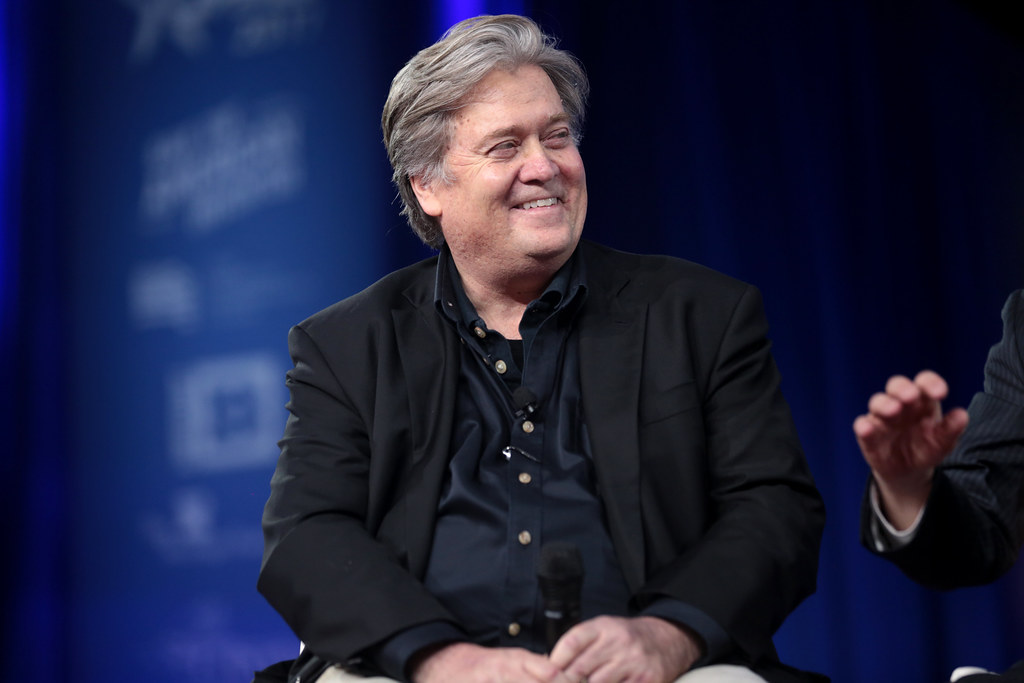Key Takeaways
- Steve Bannon accused many U.S. teachers of being “terrorists” at a public memorial.
- He made the remarks at State Farm Stadium during Charlie Kirk’s service.
- Bannon claimed about a third of teachers act like “teacher terrorists.”
- His words sparked a heated debate over politics in classrooms.
On Sunday, Steve Bannon hosted a memorial for Charlie Kirk at State Farm Stadium in Arizona. Co-host Gina Loudon praised Kirk’s support for marriage and large families. Then Bannon took the stage and made a sharp claim. He said that from kindergarten onward, too many teachers push radical ideas. He even called a third of them terrorists. Those words drew gasps and cheers from parts of the crowd. Yet they also unleashed strong criticism online and in the media.
Bannon’s Bold Accusation at Memorial
First, Bannon set the scene by talking about Charlie Kirk’s reach. He said Kirk built a massive audience with Turning Point. Then Bannon turned to education. He warned parents that some teachers teach politics, not just reading and math. He accused them of filling young heads with views that clash with conservative values. He said, “From the first day of school, one in three teachers tries to form kids like activists.” That blunt description shocked many who view teachers as devoted professionals.
Next, Bannon framed his attack as part of a bigger culture fight. He argued that schools now push a liberal agenda. He blamed textbooks and lesson plans for swaying student opinions. In his view, these lessons go beyond facts. They push ideas about politics, history, and identity that he opposes. He described that push as a form of extremism. His speech aimed to rally conservatives to fight back in schools as they do in politics.
Why Bannon Used the Term Teacher Terrorists
Bannon chose the shocking phrase teacher terrorists to grab attention. He wanted people to see education as a battleground. In his words, these so-called teacher terrorists use lessons to reshape children’s beliefs. He warned parents to stay alert and fight what he called “indoctrination.” Moreover, he claimed parents should rally at school board meetings to push back. Thus, Bannon framed the debate as a fight for young minds.
However, critics say that calling teachers teacher terrorists goes too far. They point out that most educators aim to teach facts, not ideology. They say Bannon’s words unfairly paint all teachers as radicals. Still, Bannon defended his phrase as a wake-up call. He argued that harsh language is needed to match what he views as an aggressive liberal push. As a result, his comments add fuel to the culture wars over education.
Public Reaction to the Teacher Terrorists Claim
Immediately after the memorial, social media lit up. Teachers shared stories of positive classroom work. They said they focus on reading, writing, and math. They also teach values like teamwork and kindness. Many pointed out that few educators aim to mold political views. Meanwhile, parents expressed worry over Bannon’s broad accusation. They feared it might undermine trust in schools and harm teacher morale.
On the other hand, some conservative voices applauded Bannon’s bold language. They praised him for highlighting what they call biased education. They argued that some schools do push controversial ideas without balance. For them, the label teacher terrorists fit those cases. They said Bannon sparked a needed debate on transparency in teaching. Thus, supporters believe his remarks will encourage more parental involvement in schools.
Impact on Education and Politics
Bannon’s remarks arrive amid heated fights over book bans and school policies. Across the country, local districts debate lesson content on history, race, and gender. Those fights often pit conservative parents against liberal teachers. When leaders like Bannon use terms like teacher terrorists, tensions can rise. That may push school boards to adopt stricter content rules or hire watchdog groups.
Furthermore, the claim may influence upcoming elections. Campaigns now tap into school-related fears on both sides. Candidates promise to protect children from extreme views or defend academic freedom. As education becomes a top issue, labels such as teacher terrorists could sway voter opinions. In that sense, Bannon’s speech may echo in ballots and board votes for months.
Looking Ahead
With debates heating up, schools may see more protests and policy clashes. Parents and educators will likely step up their arguments. Some will push for clear lesson outlines and parent review panels. Others will defend teacher autonomy and oppose labels like teacher terrorists. Meanwhile, political operatives will track how these conflicts influence turnout. Thus, Bannon’s shocking claim could shape not just local classrooms but also national politics.
In the end, the debate over education and ideology shows no sign of cooling. Both sides agree schools matter a great deal. Yet they strongly disagree on what belongs in those classrooms. As Bannon’s comments continue to circulate, communities will face tough choices. They must decide how to balance open discussion with respect for teaching expertise. That challenge may define the next wave of school board battles and campaign rallies.
Frequently Asked Questions
Why did Steve Bannon call some teachers “terrorists”?
He used the term to argue that certain educators push political views on children, which he sees as an aggressive form of indoctrination.
How did teachers react to the “teacher terrorists” claim?
Many teachers pushed back, saying they focus on academics and values, not political agendas, and felt insulted by the broad label.
Did anyone support Bannon’s choice of words?
Yes, some conservative voices praised the bold language and said it highlights real biases in some classrooms.
What might happen after these remarks?
The debate could lead to more school board fights, new education policies, and impact upcoming local and national elections.
